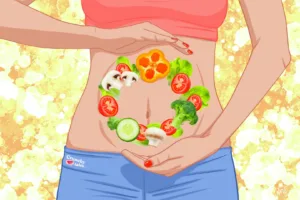Keto Diet For Women Over 50: What You Need to Know
Are you struggling with your weight? Wondering if keto diet is right for you or too good to be true? After all, the buzz around keto is seductive. Celebrities and fitness influencers endorse it, and fans boast that it can help you lose weight fast without hunger or cravings. Other claimed benefits include lower blood pressure and blood sugar, increased energy, better mental focus, slowing down ageing, and improved sleep and mood.
But is it really the best diet for women over 50, and is it safe especially long-term? Read on to discover the pros and cons of the keto diet.
What’s the keto diet?
The ketogenic diet, keto for short, is a very low-carbohydrate, high-fat diet that has become popular due to its purported health and weight loss benefits. Created in the 1920s by researcher, Russell Wilder who observed its ability to reduce the frequency and intensity of seizures in patients who followed it, it became very popular in the 70s when Dr Robert Atkins introduced the low-carb regime as a “high-calorie way to stay thin forever.”
How does it work?
The goal of the diet is to put the body into a state called ketosis which occurs when the body is deprived of carbohydrates, its preferred energy fuel source. When there isn’t enough glucose, which is made primarily from the carbohydrates you eat, your liver breaks down stored fat into ketone bodies to produce energy. Essentially ketosis fools the body into believing it is starving so it burns stored fat as fuel. The breakdown of fat along with water loss causes the quick weight loss that people experience on the keto diet especially short-term.
What can you eat on the keto diet?
The keto diet is extremely restrictive. To put the body into ketosis, the recommendation is no more than 5-10 per cent of total calories from carbohydrates. This amounts to about 20-50 grams of net carbs a day.
Net carbs are defined as carbohydrates that the body can digest. Twenty net carbs are about the amount in half a cup of pasta or one slice of bread. All food goes into the count including nutritious foods like fruits, vegetables, beans, dairy products, and whole grains. In order to reach and maintain ketosis, you have to avoid or strictly limit healthy foods like carrots (1 contains about 7g net carbs), apples (1 medium contains about 20 g net carbs), milk (1 cup contains about 12g net carbs) onions (1 cup contains 12 net carbs), and beans (1/2 cup of chickpeas has 28g net carbs)
Fat intake is high, usually around 70-80 per cent of your daily calories. The emphasis is on eating healthy fats such as avocados, nuts, seeds, and vegetable oils.
Protein intake is moderate, about 10-20 per cent of your daily calories. Consuming the right amounts of protein is important because protein, like carbohydrates, can be converted into glucose which could undermine the goal of reaching and maintaining ketosis.
However, in contrast to the keto regime, the general recommendation for macronutrients (carbohydrates, fats, and proteins) is for adults to consume 45 to 65 per cent of their total calories from carbohydrates, 20 to 35 per cent from fat, and 10 to 35 per cent from protein.
Here’s what a typical day looks like on the keto diet:
- Breakfast: Eggs cooked in butter or olive oil with avocado slices, bacon or sausage and coffee with heavy cream or coconut oil.
- Lunch: Grilled chicken or salmon over mixed greens and low-carb vegetables such as kale or broccoli, dressed with olive oil and topped with avocado or nuts.
- Snacks: A handful of almonds or cucumber slices with cream cheese or keto-friendly dip
- Dinner: Baked or grilled steak, pork, or fatty fish like salmon with steamed or roasted low-carb vegetables like asparagus or Brussels sprouts, with a side of mashed cauliflower made with butter or cream.
- Dessert: A small serving of sugar-free or dark chocolate or a keto-friendly dessert, such as fat bombs made with coconut oil and nut butter.
What are the pros?
There are several benefits of the keto diet for women over 50 such as weight loss. Research shows that in the short term following the keto diet results in weight loss and beneficial metabolic changes.
One study of obese adults found that eating a keto diet for 6 months followed by 6 months of eating a normal-calorie Mediterranean diet showed a weight loss of 10 per cent. Also, a meta-analysis of randomized controlled trials with overweight and obese subjects looking at a very-low-carbohydrate ketogenic diet versus a low-fat diet on long-term weight loss found that the keto group had a small but significantly greater reduction in weight, triglycerides, and blood pressure and a greater increase in HDL and LDL cholesterol compared with the low-fat diet.
In addition, health improvements that are typically associated with carrying excess weight also improve. For example, cholesterol and triglyceride levels, insulin resistance and high blood pressure all decreased.
The ketogenic diet because it restricts carbohydrate intake may benefit women, as well as men, with prediabetes and diabetes, too. One randomized trial comparing the effects of keto and Mediterranean diets showed that patients who followed the ketogenic diet experienced improved glucose control and reduced body weight.
After the age of 50, as women go through menopause and estrogen levels decrease, they are at an increased risk of heart disease. The ketogenic diet may have benefits in terms of heart health because it appears to lower markers of inflammation which are associated with a decreased risk of cardiovascular disease.
In addition, the keto diet may have several positive effects on appetite and food cravings. For example, because it’s high in fat it may be more satisfying and increase satiety. The decrease in carbohydrates may also lower appetite-stimulating hormones like ghrelin so you aren’t as hungry.
What are the cons?
While there are established benefits over the short term, long-term the ketogenic diet has not been extensively studied and it may not be the best choice for women over 50.
There are numerous cons. Along with being difficult to follow, possible negative side effects include hunger, nausea, bloating, constipation, diarrhoea, low mood, headaches, fatigue, and brain fog. These symptoms can last for days or weeks as your body adjusts to the diet.
It’s also very restrictive. Just how long can you go without having a slice of bread, a plate of pasta, or a banana? The diet may result in nutritional deficiencies including inadequate intakes of vitamins, minerals, and phytochemicals.
Not only are micronutrient deficiencies associated with becoming overweight or obese, but they are also linked to cancer, cardiovascular disease, and osteoporosis all of which are more prevalent in women after 50. For instance, one study found that the Atkins diet was deficient in 15 out of 27 essential micronutrients (vitamins and minerals) including several B vitamins, vitamin D, vitamin E, and zinc.
Although cauliflower, broccoli, leafy greens and flax seeds are allowed, because the diet is overall low in high-fibre foods it can result in constipation and have a negative impact on your microbiome, the bacteria and other microorganisms that live primarily in our gut. A healthy microbiome is associated with much positive health; from boosting the immune system and mental health to lowering the risk of diabetes.
The diet’s emphasis on eating a lot of animal protein can also stress your kidneys with possible chances of developing kidney stones.
While it may improve some issues associated with heart diseases such as high blood pressure and inflammation, it’s also high in saturated fat and low in fibre which can increase heart disease risk. Yes, your body might burn fat, but it might also burn muscle mass which can have a negative impact on strength. Since your brain runs solely on glucose (carbohydrate) the diet may have a negative impact on cognition, too.
Ultimately, if you have diabetes that isn’t under control, ketosis – the condition that you’re trying to reach and maintain with the keto diet – can be dangerous and even cause coma or death.
What’s really the best diet for women over 50?
The best diet for women over 50 is a whole-foods plant-based diet also known as the Mediterranean eating plan or DASH diet. Not only are these diets rich in nutrients, but they are also high in fibre which can increase satiety and aid weight loss. Eating more whole foods, fruits and vegetables can also reduce your risk of heart disease, diabetes, and cancer.
One large population-based study of over 125,000 participants in the UK for 10.6 to 12.2 years suggests that “a healthful plant-based dietary pattern—characterized by lower amounts of animal foods, sugary drinks, snacks and desserts, refined grains, potatoes, and fruit juices—is associated with lower risks of mortality and major chronic diseases”.
This diet plan can also help ease some of the symptoms of menopause. The Women’s Study for the Alleviation of Vasomotor Symptoms (WAVS) trial found that eating a low-fat, plant-based diet for 12 weeks may improve hot flashes by 88%. Participants also lost an average of 8 pounds during the study.
The Takeaway
The bottom line is that the keto diet is probably okay for healthy women over 50 for a short time who want to jumpstart weight loss. However, before starting any new diet, it’s essential to consult with a healthcare professional, especially if you have any underlying health conditions. They can help you determine if the keto diet is a safe and suitable option for you and provide guidance on how to make it work for your specific needs.
In my 30 years as a registered dietitian, I can tell you quick fixes and fad diets always backfire. Sure you may lose 10 pounds initially but unless you change your diet and add in daily exercise the weight always comes back.
Do yourself a favour and love yourself to be healthy by eating more plants, cutting out overly refined foods and processed carbs, and eating until you are satisfied not stuffed.
Like this post? Support Us or Sign up to our newsletter to get more articles like this delivered straight to your inbox!






